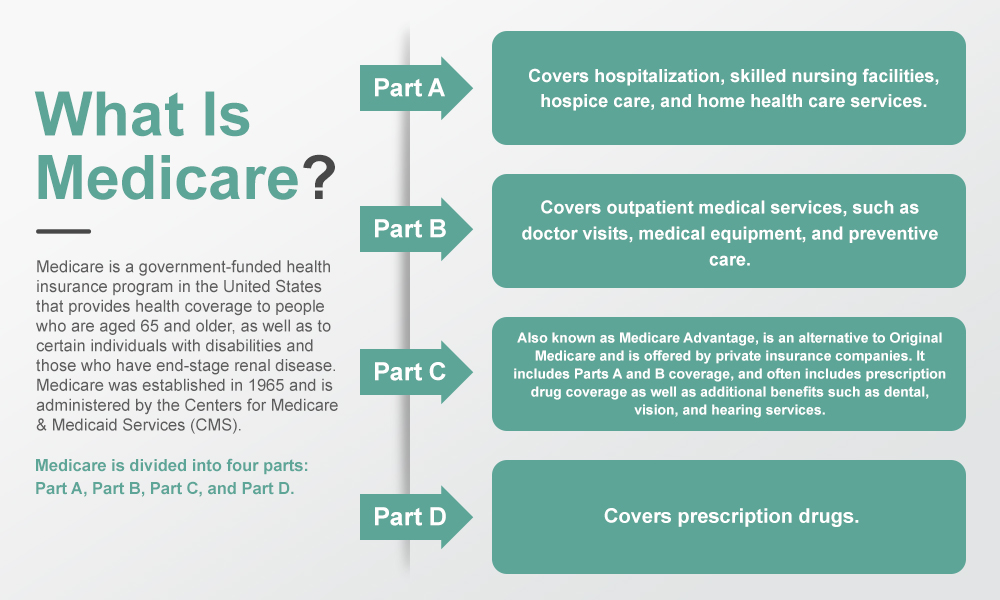What is Medicare?
Medicare is a government-funded health insurance program in the United States that provides health coverage to people who are aged 65 and older, as well as to certain individuals with disabilities and those who have end-stage renal disease. Medicare was established in 1965 and is administered by the Centers for Medicare & Medicaid Services (CMS).

Medicare is divided into four parts: Part A, Part B, Part C, and Part D.
- Part A covers hospitalization, skilled nursing facilities, hospice care, and home health care services.
- Part B covers outpatient medical services, such as doctor visits, medical equipment, and preventive care.
- Part C, also known as Medicare Advantage, is an alternative to Original Medicare and is offered by private insurance companies. It includes Parts A and B coverage, and often includes prescription drug coverage as well as additional benefits such as dental, vision, and hearing services.
- Part D covers prescription drugs.
Medicare is funded through payroll taxes, premiums paid by beneficiaries, and general government revenue.
What Are the Benefits of Medicare?
Medicare provides a range of benefits to eligible individuals, including:
- Hospitalization Coverage: Medicare Part A covers inpatient hospital stays, skilled nursing facility care, hospice care, and some home health care services.
- Medical Coverage: Medicare Part B covers doctor visits, outpatient medical services, and preventive care. It also covers medical equipment, such as wheelchairs and walkers.
- Medicare Advantage: Medicare Part C, also known as Medicare Advantage, is an alternative to Original Medicare and often includes additional benefits such as prescription drug coverage, dental, vision, and hearing services.
- Prescription Drug Coverage: Medicare Part D covers prescription drugs and can help lower the cost of medications.
- Preventive Care: Medicare provides coverage for many preventive services, including screenings for cancer, diabetes, and heart disease.
- Flexibility: Medicare allows beneficiaries to choose their healthcare providers, including doctors, hospitals, and other healthcare professionals.
- Cost Savings: Medicare can help reduce out-of-pocket costs for health care services and can provide financial protection in the event of a serious illness or injury.
Overall, Medicare provides access to affordable healthcare services to millions of Americans, helping them to maintain their health and well-being throughout their lives.
Who Is Eligible for Medicare?
To be eligible for Medicare, you must meet certain criteria:
- Age: You must be 65 years old or older.
- Disability: You may be eligible for Medicare if you have a disability and have been receiving Social Security Disability Insurance (SSDI) for at least two years.
- End-Stage Renal Disease: You may be eligible for Medicare if you have end-stage renal disease (ESRD), also known as kidney failure, and require regular dialysis or a kidney transplant.
- Amyotrophic Lateral Sclerosis (ALS): If you have ALS, also known as Lou Gehrig's disease, you are eligible for Medicare immediately upon diagnosis.
It's important to note that eligibility for Medicare is not based on income. However, some individuals may be subject to higher premiums for certain parts of Medicare if their income exceeds certain thresholds.
Additionally, U.S. citizens or permanent residents who have lived in the U.S. for at least five years are generally eligible for Medicare.
What is Medicaid?
Medicaid is a joint federal and state program that provides health insurance coverage to low-income individuals and families in the United States. The program is administered by the states with federal funding, and eligibility and benefits vary by state.
Medicaid covers a range of health care services, including hospitalization, doctor visits, prescription drugs, and long-term care services. The program also provides coverage for certain groups of people, including pregnant women, children, and individuals with disabilities.
Medicaid eligibility is generally based on income and other factors, such as family size and disability status. Eligibility rules vary by state, but in general, individuals and families with incomes below a certain threshold are eligible for Medicaid coverage.
In addition to traditional Medicaid, some states offer Medicaid expansion, which provides coverage to adults with incomes up to 138% of the federal poverty level. Medicaid expansion is available to states as part of the Affordable Care Act (ACA) and is funded by the federal government.
Overall, Medicaid provides a safety net for millions of low-income Americans who might not otherwise have access to affordable healthcare services.
What Are the Benefits of Medicaid?
Medicaid provides a range of benefits to eligible individuals and families, including:
- Health Care Coverage: Medicaid covers a wide range of health care services, including hospitalization, doctor visits, prescription drugs, and long-term care services.
- Preventive Care: Medicaid provides coverage for many preventive services, including screenings for cancer, diabetes, and heart disease.
- Mental Health Services: Medicaid covers a range of mental health services, including counseling and therapy.
- Dental and Vision Care: Medicaid covers dental and vision care services for children and some adults, depending on the state.
- Nursing Home Care: Medicaid provides coverage for nursing home care for eligible individuals who require long-term care services.
- Transportation: Medicaid may cover transportation costs for eligible individuals to attend medical appointments.
- Family Planning: Medicaid provides coverage for family planning services, including birth control, to eligible individuals.
Overall, Medicaid provides access to affordable healthcare services to millions of low-income Americans, helping them to maintain their health and well-being. The program plays a crucial role in ensuring that vulnerable populations have access to the health care they need.
Who Is Eligible for Medicaid?
Eligibility for Medicaid is determined by each state, and criteria can vary from state to state. However, in general, eligibility for Medicaid is based on income and other factors, such as family size, disability status, and age.
In states that have expanded Medicaid under the Affordable Care Act (ACA), Medicaid eligibility is available to individuals and families with incomes up to 138% of the federal poverty level. This includes adults without children, who were previously excluded from Medicaid coverage in many states.
In states that have not expanded Medicaid, eligibility criteria vary. In general, Medicaid is available to:
- Pregnant Women: Pregnant women with incomes below a certain threshold may be eligible for Medicaid coverage.
- Children: Children from low-income families are eligible for Medicaid coverage in all states, regardless of whether the state has expanded Medicaid.
- Parents: Parents and other caretaker relatives with low incomes may be eligible for Medicaid coverage.
- Individuals with Disabilities: Individuals with disabilities who meet income and other eligibility requirements may be eligible for Medicaid coverage.
- Seniors: Seniors with low incomes and limited resources may be eligible for Medicaid coverage, particularly for long-term care services.
It's important to note that eligibility rules and income thresholds for Medicaid can vary by state, and some states have additional eligibility categories beyond those listed above. If you think you may be eligible for Medicaid, you can check with your state's Medicaid agency for more information.
What's the Difference Between Medicare and Medicaid
Medicare and Medicaid are both government-funded programs that provide health care coverage to eligible individuals, but there are some key differences between the two programs.
| Medicare | Medicaid | |
| Eligibility | Medicare is available to individuals who are 65 years of age or older, individuals with certain disabilities, and individuals with end-stage renal disease. | Medicaid is available to low-income individuals and families, as well as certain other eligible groups, such as pregnant women, children, and individuals with disabilities. |
| Coverage | Medicare primarily covers health care services related to medical treatment, such as hospital stays, doctor visits, and prescription drugs. | Medicaid covers a wider range of health care services, including long-term care services, dental and vision care, and transportation to medical appointments. |
| Cost | Medicare is primarily funded by payroll taxes and premiums paid by beneficiaries. | Medicaid is jointly funded by the federal government and the states. In general, Medicaid is a less expensive program for beneficiaries, with lower out-of-pocket costs and no premiums for most individuals. |
| Administration | Medicare is administered by the federal government. | Medicaid is administered by the states with federal funding. This means that eligibility criteria, coverage, and benefits can vary by state for Medicaid. |
Overall, while both programs provide important healthcare coverage to eligible individuals, they have different eligibility criteria, coverage, cost structures, and administration.
What is the cost of Medicare and Medicaid?
The costs of Medicare and Medicaid are different and depend on a variety of factors.
Medicare costs:
- Part A: Most people do not pay a premium for Part A because they or their spouse paid Medicare taxes while working. However, there may be deductibles, coinsurance, and copayments for some services.
- Part B: The standard monthly premium for Part B in 2022 is $170.10, but this amount may be higher for individuals with higher incomes. There may also be deductibles, coinsurance, and copayments for some services.
- Part C: The costs of Medicare Advantage plans vary depending on the plan and location. Some plans have monthly premiums, deductibles, and copayments for services.
- Part D: The costs of Part D plans vary depending on the plan and location. Some plans have monthly premiums, deductibles, and copayments for prescription drugs.
Medicaid costs:
- Most individuals enrolled in Medicaid do not pay a premium, although there may be some cost-sharing for certain services. Some states may charge premiums or copayments for some Medicaid services, but these amounts are typically lower than the costs of comparable private insurance.
Overall, the costs of Medicare and Medicaid vary depending on the individual's income, eligibility criteria, plan choices, and healthcare needs. It's important to review plan options carefully and understand the costs and benefits of each before making a decision.


